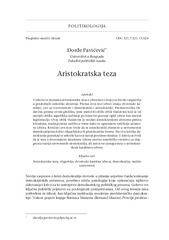Prikaz osnovnih podataka o dokumentu
Aristocratic thesis
Aristokratska teza
| dc.creator | Pavićević, Đorđe | |
| dc.date.accessioned | 2021-04-02T12:17:28Z | |
| dc.date.available | 2021-04-02T12:17:28Z | |
| dc.date.issued | 2016 | |
| dc.identifier.issn | 1820-6700 | |
| dc.identifier.uri | http://rfpn.fpn.bg.ac.rs/handle/123456789/597 | |
| dc.description.abstract | The article deals with the aristocratic thesis about the character of the elections in representative governments, which has been widely discussed in political theory in previous decades. According to the thesis, the elections have two faces - they are in the same time aristocratic and democratic by nature. As a mixture of democratic and aristocratic principle, representative democracy remains a mixed form of government. The main difference between this form of government and the older form of mixed republic is that general elections have become a method of legitimating the government. This form of government is allied with democratic elitism in their effects, despite the differences in justification of the essential role of elections in democratic processes. According to critics, the aristocratic element in contemporary democracies is more like oligarchic or plutocratic in traditional sense of the word. These critics occasionally refer to this state of affairs as a state of postdemocracy. The main thesis of the article is that differentiation between the two faces of elections is a powerful toll for analysis of contemporary democracies. The author does not defend the aristocratic thesis itself. | en |
| dc.description.abstract | U tekstu se razmatra aristokratska teza o izborima o kojoj se široko raspravlja u poslednjih nekoliko decenija. Prema ovoj tezi izbori imaju dvostruki karakter, oni su istovremeno i demokratski i aristokratski. Predstavnička vladavina, prema ovom gledištu, jeste mešoviti oblik vladavine koji se od starijih oblika republika razlikuje po tome što postoje opšti izbori kao metod legitimacije. Ovaj oblik vladavine je srodan demokratskom elitizmu prema ishodima, mada postoje razlike u tome kako se opravdava središnja ustanova izbora. Kritičari ove teze tvrde da se aristokratski element u savremenim demokratijama dobio oligarhijsku ili plutokratsku formu. Na ovu kritiku demokratije ponekad se referiše kao na stanje postdemokratije. U tekstu se tvrdi da je teza o dvostrukom karakteru izbora moćno analitičko sredstvo za dijagnozu stanja savremenih demokratija, ali autor ne zastupa tezu o aristokratskom karakteru izbora. | sr |
| dc.publisher | Univerzitet u Beogradu - Fakultet političkih nauka, Beograd | |
| dc.rights | openAccess | |
| dc.source | Godišnjak Fakulteta političkih nauka | |
| dc.subject | aristocratic thesis | en |
| dc.subject | oligarchy | en |
| dc.subject | two faces of elections | en |
| dc.subject | democracy | en |
| dc.subject | principle od distinction | en |
| dc.subject | aristokratska teza | sr |
| dc.subject | oligarhija | sr |
| dc.subject | dvostruki karakter izbora | sr |
| dc.subject | demokratija | sr |
| dc.subject | načelo izuzetnosti | sr |
| dc.title | Aristocratic thesis | en |
| dc.title | Aristokratska teza | sr |
| dc.type | article | |
| dc.rights.license | ARR | |
| dc.citation.epage | 24 | |
| dc.citation.issue | 16 | |
| dc.citation.other | 10(16): 9-24 | |
| dc.citation.rank | M51 | |
| dc.citation.spage | 9 | |
| dc.citation.volume | 10 | |
| dc.identifier.fulltext | http://rfpn.fpn.bg.ac.rs/bitstream/id/401/594.pdf | |
| dc.identifier.rcub | https://hdl.handle.net/21.15107/rcub_rfpn_597 | |
| dc.type.version | publishedVersion |

